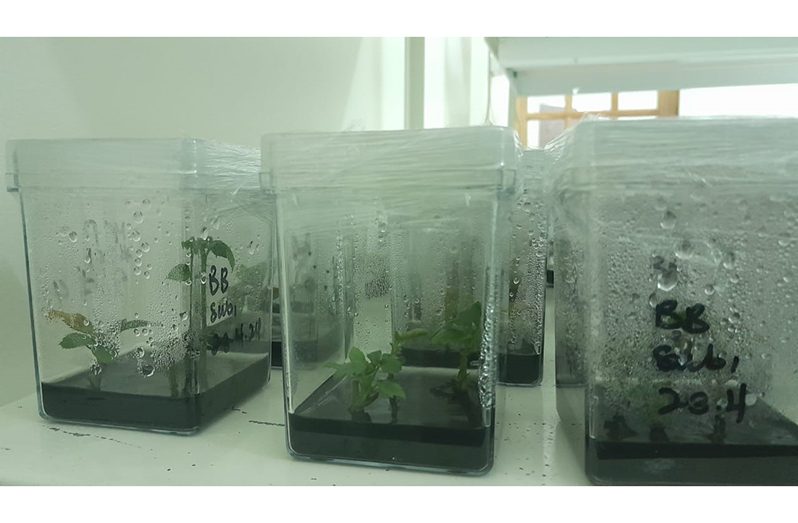WITH massive import dependence on blackberries—considered one of the world’s exotic fruits – the Government of Guyana, through the National Agricultural Research and Extension Institute (NAREI), is in a race to produce this crop by next year, in keeping with CARICOM’s 25 percent by 2025 initiative.
To cultivate this berry, NAREI is breaking away from the reliance of seeds and cuttings to produce plantlets and, is in fact, using the modern farming method of tissue culture. At present, there are 70 blackberry plants being monitored under shaded conditions by researchers at the institution.
Tissue culture, also known as micropropagation, is a technique in which fragments of plants are cultured and grown in a laboratory. This technology has proven to be beneficial for the production of disease-free planting materials and increase plant yield. It only requires a sterile workplace, greenhouse, nursery and trained staff, making it cost-effective.
NAREI’s Research Scientists, Samantha Weever and Amrita Churaman, along with Research Assistant, Crystal Charles are spearheading the lab aspect of this project.
Giving more details on this venture, Weever said that her team started working on the micropropagation of blackberry in 2023 as part of the Government’s commitment to the “Twenty-five by 2025 Initiative” aimed at reducing extra-regional agri-food imports by 25 percent by 2025.
“For us to reduce importation of commodities like strawberry, blueberry and blackberry, it would mean that we need to first have these crops growing in Guyana and have varieties that are adaptive to our environment and to provide disease-free planting materials to farmers,” Weever explained.

Last year, the institute managed to source blueberry plantlets through an international exchange programme and research staff were able to develop a protocol for the regeneration of blackberry plants in just under a year.
“For blackberry initiation, we would have taken the shoot tips from the blackberry plants or the noodle segment (from the stem to the leaf) bring it to the lab and sterilize it using bleach or alcohol. Once cleaned, we add it to the growth medium which would have all the requirements the plant needs as if it was being grown in the soil,” Weever explained.
Once roots are formed, the plants are then removed from their tube and transferred into soil under shaded conditions. At this stage, the plants will be carefully monitored for potential diseases or pest.
Because the berry is in its research stage, only a sample size of 200 to 500 is being done at a time. Once it has proven successful in the end stage, it will then be multiplied by the thousands and distributed to farmers.
The regeneration of blackberry seedlings through tissue culture is nothing new to Weever as she and her team have already successfully produced pineapples, bananas, plantains, sweet potatoes, cassavas and breadfruit via invitro. Farmers are already reaping the benefits of those plants.
“Tissue culture has been done successfully since the 1980s.
In 2014, I started working on crops like pineapples, bananas, cassavas, plantains, sweet potatoes mainly because of demand from farmers,” she told this newspaper while adding that in 2018, NAREI ventured into crops like breadfruit, ginger, turmeric, black pepper since there was a demand for disease-free planting materials. With tissue culture, there is more success than failure because in the lab there is a more controlled environment.
The field research stage would indicate how the crop is growing and what pests or diseases it’s susceptible to. Depending on the research data, the lab staff would determine whether they would need to tweak the medium used in propagating the crop.
Developing a protocol can take as little as six months to three years as in the case of breadfruit.
Vision 25 by 2025 was realised in 2021, laying the foundation for a long-term social and economic partnership among CARICOM member states to address the region’s rising food-import bill.





.jpg)








